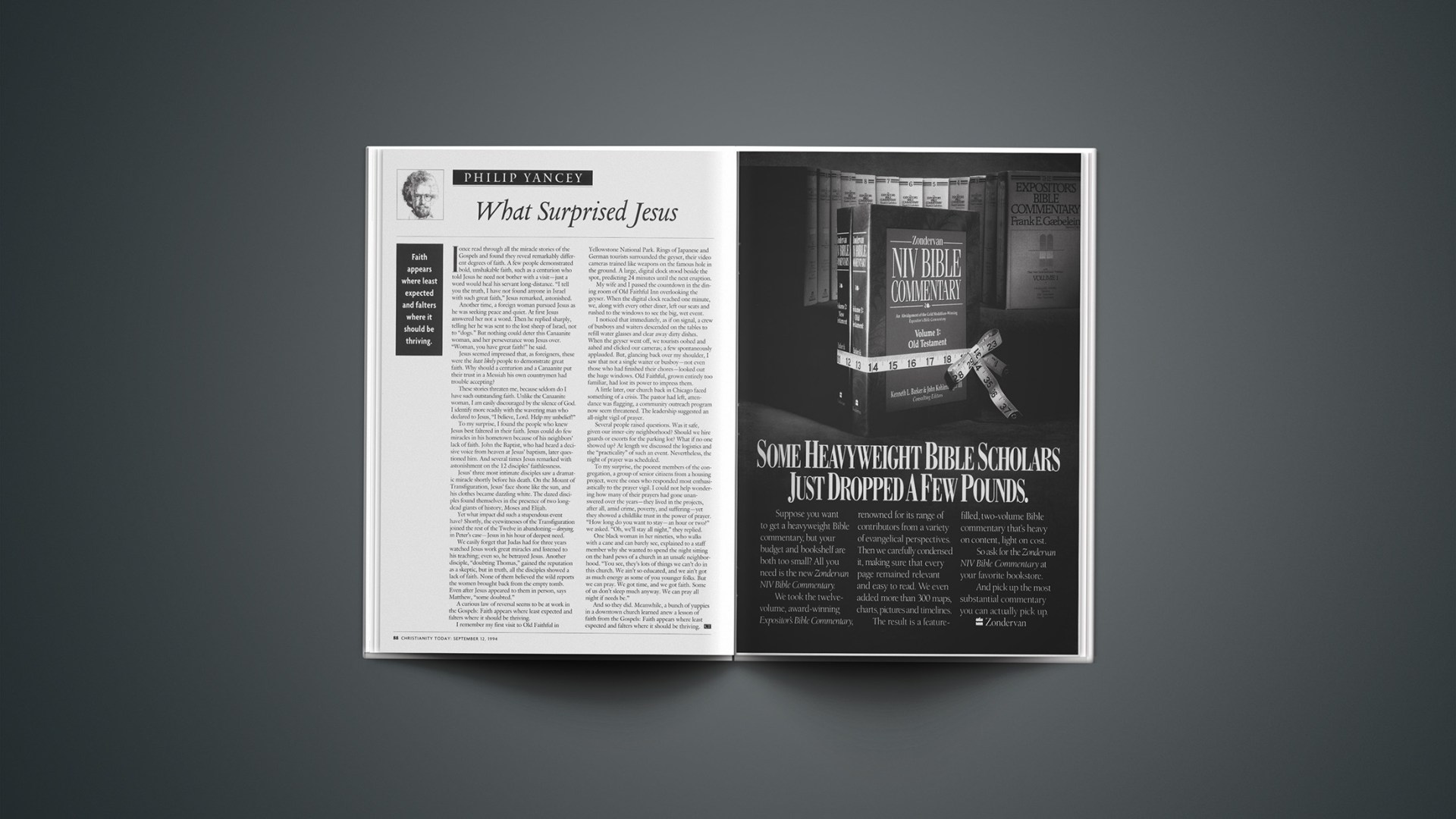I once read through all the miracle stories of the Gospels and found they reveal remarkably different degrees of faith. A few people demonstrated bold, unshakable faith, such as a centurion who told Jesus he need not bother with a visit-just a word would heal his servant long-distance. “I tell you the truth, I have not found anyone in Israel with such great faith,” Jesus remarked, astonished.
Another time, a foreign woman pursued Jesus as he was seeking peace and quiet. At first Jesus answered her not a word. Then he replied sharply, telling her he was sent to the lost sheep of Israel, not to “dogs.” But nothing could deter this Canaanite woman, and her perseverance won Jesus over. “Woman, you have great faith!” he said.
Jesus seemed impressed that, as foreigners, these were the least likely people to demonstrate great faith. Why should a centurion and a Canaanite put their trust in a Messiah his own countrymen had trouble accepting?
These stories threaten me, because seldom do I have such outstanding faith. Unlike the Canaanite woman, I am easily discouraged by the silence of God. I identify more readily with the wavering man who declared to Jesus, “I believe, Lord. Help my unbelief!”
To my surprise, I found the people who knew Jesus best faltered in their faith. Jesus could do few miracles in his hometown because of his neighbors’ lack of faith. John the Baptist, who had heard a decisive voice from heaven at Jesus’ baptism, later questioned him. And several times Jesus remarked with astonishment on the 12 disciples’ faithlessness.
Jesus’ three most intimate disciples saw a dramatic miracle shortly before his death. On the Mount of Transfiguration, Jesus’ face shone like the sun, and his clothes became dazzling white. The dazed disciples found themselves in the presence of two long-dead giants of history, Moses and Elijah.
Yet what impact did such a stupendous event have? Shortly, the eyewitnesses of the Transfiguration joined the rest of the Twelve in abandoning-denying, in Peter’s case-Jesus in his hour of deepest need.
We easily forget that Judas had for three years watched Jesus work great miracles and listened to his teaching; even so, he betrayed Jesus. Another disciple, “doubting Thomas,” gained the reputation as a skeptic, but in truth, all the disciples showed a lack of faith. None of them believed the wild reports the women brought back from the empty tomb. Even after Jesus appeared to them in person, says Matthew, “some doubted.”
A curious law of reversal seems to be at work in the Gospels: Faith appears where least expected and falters where it should be thriving.
I remember my first visit to Old Faithful in Yellowstone National Park. Rings of Japanese and German tourists surrounded the geyser, their video cameras trained like weapons on the famous hole in the ground. A large, digital clock stood beside the spot, predicting 24 minutes until the next eruption.
My wife and I passed the countdown in the dining room of Old Faithful Inn overlooking the geyser. When the digital clock reached one minute, we, along with every other diner, left our seats and rushed to the windows to see the big, wet event.
I noticed that immediately, as if on signal, a crew of busboys and waiters descended on the tables to refill water glasses and clear away dirty dishes. When the geyser went off, we tourists oohed and aahed and clicked our cameras; a few spontaneously applauded. But, glancing back over my shoulder, I saw that not a single waiter or busboy-not even those who had finished their chores-looked out the huge windows. Old Faithful, grown entirely too familiar, had lost its power to impress them.
A little later, our church back in Chicago faced something of a crisis. The pastor had left, attendance was flagging, a community outreach program now seem threatened. The leadership suggested an all-night vigil of prayer.
Several people raised questions. Was it safe, given our inner-city neighborhood? Should we hire guards or escorts for the parking lot? What if no one showed up? At length we discussed the logistics and the “practicality” of such an event. Nevertheless, the night of prayer was scheduled.
To my surprise, the poorest members of the congregation, a group of senior citizens from a housing project, were the ones who responded most enthusiastically to the prayer vigil. I could not help wondering how many of their prayers had gone unanswered over the years-they lived in the projects, after all, amid crime, poverty, and suffering-yet they showed a childlike trust in the power of prayer. “How long do you want to stay-an hour or two?” we asked. “Oh, we’ll stay all night,” they replied.
One black woman in her nineties, who walks with a cane and can barely see, explained to a staff member why she wanted to spend the night sitting on the hard pews of a church in an unsafe neighborhood. “You see, they’s lots of things we can’t do in this church. We ain’t so educated, and we ain’t got as much energy as some of you younger folks. But we can pray. We got time, and we got faith. Some of us don’t sleep much anyway. We can pray all night if needs be.”
And so they did. Meanwhile, a bunch of yuppies in a downtown church learned anew a lesson of faith from the Gospels: Faith appears where least expected and falters where it should be thriving.
Copyright © 1994 Christianity Today. Click for reprint information.










